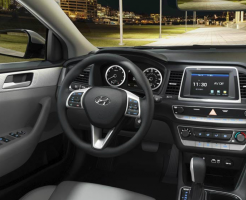
— A Hyundai and Kia airbag lawsuit alleges both automakers, in addition to parts manufacturer ZF TRW, are guilty of installing defective airbag control units in these models.
- 2012-2016 Kia Optima Hybrid
- 2013 Kia Forte
- 2013 Kia Forte Koup
- 2013-2019 Kia Optima
- 2013-2019 Hyundai Sonata
- 2013-2019 Hyundai Sonata Hybrid
- 2014 Kia Sedona
According to the plaintiff, the airbag problem is especially dangerous because it occurs only when a crash occurs, the very time an airbag is necessary. The allegedly defective component is the integrated circuit of the airbag control unit that can suffer from electrical overstress.
The problem of overstress is allegedly caused by the electrical signals from the airbag sensors which prevents the airbags from deploying. The proposed class action lawsuit also alleges the seat belt pretensioners will fail at the same time the airbags fail.
Hyundai and Kia allegedly knew about the airbag problems for years before finally letting customers know. The plaintiff claims ZF TRW and both automakers investigated airbag failures between 2011 and 2015 but waited until 2015 to inform the National Highway Traffic Safety Administration (NHTSA).
Hyundai and Kia also allegedly downplayed the serious defects even when vehicles were finally recalled in 2018.
According to NHTSA, airbag failures killed four people and injured six by March 2018 when federal safety regulators opened an investigation into failures in 2011 Hyundai Sonatas and 2012-2013 Kia Fortes.
Tennessee plaintiff Jennifer Johnson owns a 2014 Hyundai Sonata she purchased in July 2015 from a Kia dealership. Although she doesn't claim the vehicle has suffered airbag problems, Johnson says if she would have known about the airbag control units she wouldn't have purchased the Sonata.
The plaintiff says Hyundai and Kia vehicles are worth less than they should be because of the airbag control unit problems, and allegedly none of the vehicles were fit for ordinary use by consumers when the vehicles were sold. In addition, Hyundai and Kia continued to profit from selling the vehicles by concealing the true nature of the problems.
By claiming the automakers knew of airbag problems, the plaintiff points to an incident in August 2011 when a Kia Forte airbag failed in a Chinese crash. An investigation conducted with ZF-TRW allegedly showed the airbag control unit told the airbags not to deploy.
Then in February 2012, Hyundai learned of a crash of a 2011 Hyundai Sonata with airbags that failed to deploy. ZF-TRW allegedly determined the airbag control unit had been damaged by an electrical overstress condition.
Both Hyundai and Kia issued recalls due to airbag control units that were susceptible to electrical overstress that occurred during crash impacts. But the lawsuit alleges Hyundai and Kia failed to recall all the affected vehicles, making owners believe similar vehicles were safe.
The Hyundai and Kia airbag lawsuit was filed in the U.S. District Court for the Central District of California, Southern Division - Johnson, et al., v. Hyundai Motor America, Inc., et al.
The plaintiff is represented by Keller Rohrback.




